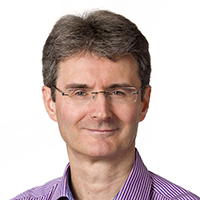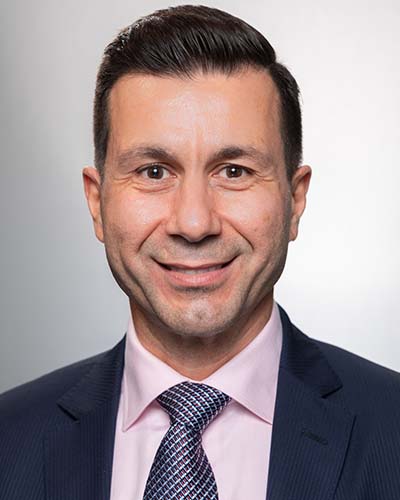

- Tom Alford
- Deputy Editor, Treasury Management International
The new President of the UK Association of Corporate Treasurers (ACT) is Dino Nicolaides. As a long-standing supporter of the ACT, and a passionate advocate for the profession, he has taken on this important role as treasurers the world over face increasingly challenging economic circumstances. TMI talked to him about his approach and vision.
Around five years ago, Nicolaides joined the ACT Council. Having been steeped in the values and aims of this respected professional body, he has now stepped up as its new President. It’s a role he will carry for the next year, with the following year in the ceremonial position of Immediate Past President. The responsibility he undertakes now is in addition to his day job as the UK & Ireland Treasury Advisory lead for the global treasury specialist, Redbridge Debt & Treasury Advisory.

Dino Nicolaides
President , Association of Corporate Treasurers (ACT)
Taking on the presidency of a key professional body in the corporate financial space would be demanding under normal conditions. But the world’s economies are far from normal right now, and hence this title is going to call upon all the skill and judgment that Nicolaides has accumulated over many years’ involvement in the finance and treasury community if he is to keep a steady hand on the tiller. Almost needless to say, he has the right credentials.
Following a degree in Economics at Cambridge, and qualification in financial services audit with Touche Ross (now Deloitte) in London, Nicolaides returned to his native Cyprus where he engaged in a raft of demanding treasury projects. This led to him studying for the AMCT (Diploma in Treasury Management) qualification, which he achieved in 2004.
In 2007, Nicolaides came back to London, his focus fixed firmly on supporting the treasury community. A role at KPMG Treasury Advisory Services was followed in 2011 with a return to Deloitte, this time heading up the firm’s treasury advisory team in its audit service line. By 2018 he had joined Redbridge Debt & Treasury Advisory, taking on his current assignment as Head of Treasury Advisory UK & Ireland.
With more than two decades’ treasury practice under his belt, Nicolaides has seen many changes. But for the most part he feels that the role of treasurer has evolved at a measured pace, rather than being subject to the abrupt ‘big-bang’ shifts seen in functions such as IT. Indeed, arguably, it has taken the arrival of tough times for non-treasurers to understand the real value of treasury.
“Up to about 15 years ago, many CFOs treated treasury as a ‘black box’,” Nicolaides comments. “They would appoint a treasurer who would work in an ivory tower, with little input into the corporate’s financial and commercial strategy. Mostly, CFOs made little effort to understand the idea of treasury. But in the past decade, CFOs and executive management began to realise that their treasurer was, in fact, a key strategic partner to the organisation.”
As an example of this shift in perspective, Nicolaides notes that treasurers not only manage relevant communication lines with banks, capital markets and other external stakeholders but also increasingly advise on funding models. These models enable the smooth implementation of a wider corporate strategy that might, for instance, involve key acquisitions or investments for organic growth.
Professional integrity
As a strategic adviser, credibility is key. To this end, Nicolaides notes how, in recent times, executive management has become more aware of the enhancement that the ACT treasury qualifications bring to the role. This, he says, is particularly borne out in terms of qualified treasurers’ knowledge, confidence and professionalism, both internally and externally, which he feels adds “significant value” to the organisation.
Recognition within the corporate leadership of the clear benefits of professional study, he continues, has also seen many organisations commissioning the ACT for targeted courses and apprenticeships for their treasury staff. “As a result, CFOs are now making a conscious effort to gain a much deeper understanding of the role of the treasurer and their team, and it’s why we have also seen numerous recent examples of treasurers making it to the CFO position.”
While the role of treasurer has finally been anchored in corporate life, the push for wider recognition necessarily continues, says Nicolaides. “Many larger and more complex organisations can now see the need for an ACT-qualified treasury professional, but we still see smaller organisations overlooking the value that a qualified treasurer can bring to the table.” The fact is that for businesses of every size, with rising interest rates, inflation, turbulence in the bond markets and so on, each has an impact on treasury risk. “These risks need to be managed carefully, ensuring that this is done in line with the evolving risk appetite of the organisation’s key stakeholders.”
Indeed, an interest rate risk management policy that served well when interest rates were historically low, or an FX risk management policy when sterling was strong against major currencies, may no longer be fit for purpose. “The expert to analyse these changes, comprehend the future strategic direction of the organisation, assess the impact on the financial position, and recommend a change in advance of a storm is the treasurer,” states Nicolaides. “I struggle to see how a best-in-class organisation can operate effectively in the current dynamic economic environment without close co-operation with, and reliance on, a sound treasurer and treasury team”.
Staying agile
That the treasury role has slowly morphed into one that has recognised strategic value and importance is not lost on the ACT, notes Nicolaides. It too has transformed itself, and over its more than 40 years of existence has shifted its stance to best represent the needs of modern organisations. That being said, he believes that at the heart of all it does are its vision and mission statements.
“Our vision is that treasury everywhere has the highest standards of professionalism, bringing success to organisations and creating strong economies through the strategic balancing of financial risks and opportunities. Our mission is to embed the highest standards of professionalism and integrity into the treasury world, and act as its leading advocate.”
For Nicolaides, these are “timeless statements of strong intent”. But in order for the ACT to deliver, he says it has to constantly assess the changing economic environment, and the impact that this is having on the members. In taking on the mantle of ACT President in today’s rather dynamic and challenging environment, he has set out a number of priorities for his year-long tenure. Ultimately, his aim is to uphold the ACT’s mission and vision statements, but in particular he will ensure that the ACT “remains relevant to its members and their changing needs”. This means securing its continuity as an “agile and diverse organisation that can flex to the changing economic and financial environment within which our members feel an integral part”.
The whole organisation is under no illusion that what it does today “may call for a very different approach to how we will achieve what’s needed in five years’ time”. To help reach its goals, Nicolaides explains much of the ACT’s learning is drawn from member surveys and conversations at events “about what works, what needs attention, and what needs to be implemented”, with the overarching aims of its vision and mission in the driving seat at all times.
Future assured
Perhaps one of the most dynamic areas of change in the treasury space has been the arrival and deployment by some of new technologies, most recently the loudest conversations being around APIs and AI. The expectations of what will be possible with such tools in five or 10 years’ time though is the subject of much conjecture.
While it’s clear to Nicolaides from his day job that not every treasury has access to the cutting-edge tools that vendors and banks are offering today, he believes that most are aware of the power of technology. Indeed, most understand that process automation can increase the efficiency and effectiveness of the function, and even add value to the wider organisation.
But Nicolaides also feels that the advance of technology is not about to remove the human treasurer from their role, as some may speculate. “In my view, the suitability of technology for a task depends to a degree on the confidence in that technology to deliver. But it will also be measured by the severity of the consequences should they direct an incorrect action,” he notes. “If a business blindly trusts technology to provide answers that could have an existential impact, it may not be the way to go.”
For this reason, while the application of AI and ML to cash flow forecasting, for instance, may present huge advantages for treasurers in mitigating their cash and liquidity risks, there is a major caveat when considering their deeper involvement in treasury decisions.
“I do not believe that technology could give answers to all questions or replace the human treasurer,” Nicolaides states. “Our economies are dynamic, and no two problems faced by treasurers are identical. Deep knowledge, expertise, and past experience are all required to apply the relevant level of judgment in getting to the best possible solution under the circumstances. And this, in my view, will never change.”
In much the same way the majority of the flying public would not accept a pilotless plane, preferring instead the well-trained and experienced command of the human pilot should a problem arise, most businesses want to know that their finances are in the hands of well-trained and experienced professionals if the worst happens. With the role of the ACT in upholding that level of professionalism clearly stipulated, Nicolaides is certain that its future, and that of its members, is assured.



